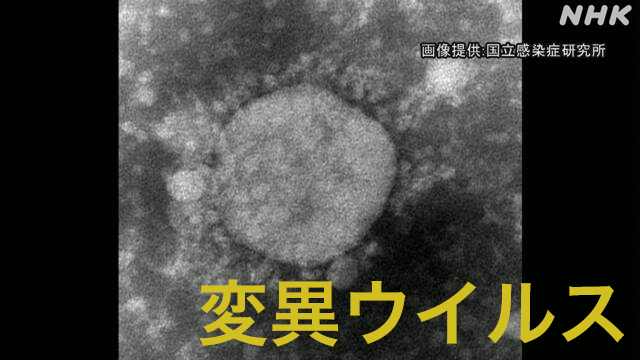A mutated new coronavirus that is said to be highly infectious.
A new infection that appears to be a cluster has been identified.
Eleven people in their twenties to fifties who live in nine prefectures are all related to the workplace using the same facility and have no history of staying abroad.
In addition, in Kanagawa Prefecture, a mutant virus that has spread in South Africa was detected in men and women in their 40s and 50s who have never stayed abroad.
So far, 43 cases of mutant virus have been found in airport quarantine, and 62 cases other than quarantine, totaling 105 cases, and there is concern that the infection will spread in Japan.
What is a mutant virus?
Many viruses undergo tiny mutations in their genetic information over time.
Previous studies have shown that the new coronavirus causes small mutations at a pace of about once every two weeks.
However, in most cases these mutations do not affect the nature of the virus.
However, the mutant virus confirmed in the United Kingdom, the mutant virus spread in South Africa, and the mutant virus found in Brazil are all thought to have changed their virus properties due to mutation.
What all three have in common is that the genetic information of "spiked protein", which serves as a scaffold for the new coronavirus to infect human cells, has a mutation called "N501Y" that changes amino acids. ..
According to a report from the United Kingdom, this change may increase the susceptibility to infection by up to 70%.
Also, recently, another mutation has been attracting attention.
In the mutant virus found in South Africa and the mutant virus found in Brazil, a mutation called "E484K" has been confirmed.
It is thought that the mutation of "E484K" makes it easier for the virus to escape from the attack of the antibody, and it has been reported that the effect of the antibody was weakened even in experiments using cells.
As a result, there are concerns that ▼ the effectiveness of the vaccines currently in use will not be affected, and ▼ people who have been infected once may be infected again.
Human immunity is not determined solely by antibodies, and the effects of vaccines are expected not only to suppress the onset but also to prevent aggravation. Therefore, detailed investigations and studies are currently underway on the effects. I have.
Flow of mutant virus detection
Mutant virus detection was performed by the National Institute of Infectious Diseases by decoding all the genes of the virus, but the National Institute of Infectious Diseases has developed a method to specifically and rapidly detect mutant viruses by PCR tests. However, inspections using this method are now being carried out at local health laboratories around the world.
Local health laboratories in each region are conducting PCR tests to quickly detect mutant viruses by extracting a certain percentage of the samples that have been confirmed to be positive for the new coronavirus by ordinary tests. If it is found that there is a possibility of the virus, the sample is sent to the National Institute of Infectious Diseases for confirmation.
Under these circumstances, in Tokyo, as a result of examining the samples of 1710 people who were confirmed to be infected with the new coronavirus by PCR tests by the 29th of last month, the mutant virus was detected in the samples of 2 people. It seems that only a part of them have not become the mainstream of infection.
Expert “While there is no spread in the city, it is necessary to continue monitoring”
Takaji Wakita, director of the National Institute of Infectious Diseases, said at a press conference on the night of the 9th, "Mutant strains are now being detected in various places, but in most cases the route of infection is being followed. With people infected with the mutant strain I don't think we're in a situation where we're infected with a mutant strain in the city without a connection, "he said. Yes, it is necessary to continue monitoring.

